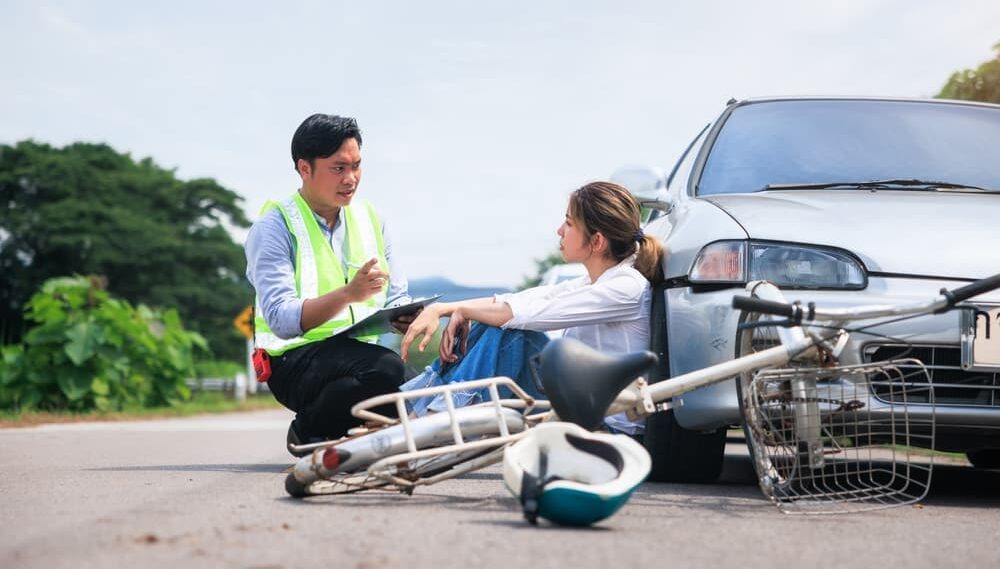
After a bicycle accident, you might file a claim to cover your damages and injuries. One of your first questions is, “How long will this process take?” It’s crucial to consult with a bicycle accident lawyer to navigate the legal complexities and ensure you receive the compensation you deserve.
Schedule a Free Initial Consultation Today!
Factors Influencing the Timeline of a Bicycle Accident Claim
Regarding bicycle accident claims, several factors can significantly influence how long it takes to reach a resolution. These factors range from the specifics of the accident to the extent of injuries and the total damages being claimed.
Nature of the Accident
The details of the accident itself play a role in determining the timeline of a claim. In cases where the liability is clear and undisputed, such as when a cyclist is hit by a vehicle violating traffic laws, the claim may be resolved more quickly.
However, the case becomes more complicated if there’s ambiguity about who is at fault or if multiple parties are involved. This complexity often requires additional investigation and legal maneuvering, extending the time to settle or litigate the claim.
Severity of Injuries
Another major factor is the severity of the injuries sustained in the bicycle accident. More severe injuries typically result in more complicated medical assessments, as they may require ongoing treatment and evaluation to understand the full extent of the harm and the long-term implications.
This process ensures that any settlement covers the full scope of the injuries, including future medical needs and potential long-term care.
As such, the more severe the injuries, the longer it may take to gather all the necessary medical evidence and reach a settlement that adequately compensates for these damages.
Amount of Damages
Finally, the total amount of damages claimed directly affects the claim’s timeline.
Larger claims, particularly those involving significant medical expenses, lost income, or long-term disability, typically take longer to negotiate. More is at stake for the claimant and the insurer in these cases, leading to more intensive negotiations.
The process involves establishing the value of immediate losses and quantifying future expenses and non-economic damages like pain and suffering. The higher the stakes, the more time it often takes to reach an agreement accurately reflecting the accident’s full impact on the cyclist’s life.
The Legal Process in Bicycle Accident Claims
Each bicycle accident claim involves several legal steps, each contributing to the overall timeline of the case.
Investigation Phase
The investigation phase is the foundation of any bicycle accident claim.
This stage involves:
- Gathering Evidence: Collecting comprehensive evidence is crucial for building a strong case. It includes obtaining medical records to document the extent of injuries, police reports that provide an official account of the accident, and photographs or videos of the accident scene.
- Witness Statements: Investigators may need to track down witnesses, conduct interviews, and document their testimonies, a process that can be time-consuming but useful for corroborating the details of the accident.
- Expert Analysis: In some cases, the services of accident reconstruction experts or medical experts are needed to provide a professional opinion on the cause of the accident and the extent of injuries. Coordinating with these experts and incorporating their findings into the case takes additional time.
Negotiations with Insurance Companies
Negotiating with insurance companies is often one of the most time-intensive aspects of a bicycle accident claim:
- Initial Settlement Offers: Insurance companies typically start with a lower settlement offer. It then becomes a matter of negotiating up from this point, which can involve several rounds of discussions.
- Counteroffers and Discussions: Each counteroffer and subsequent discussion can extend the timeline. Both sides present their arguments, justify their claim valuation, and negotiate the settlement terms.
- Reaching a Fair Agreement: The goal is to reach an agreement that adequately compensates for the injuries and damages. This process requires patience and strategic negotiation to ensure that the final settlement is fair and just.
Legal Procedures
The legal procedures involved in a bicycle accident claim also play a significant role in its timeline:
- Filing the Claim: The process begins with filing the claim, which must be done within the statute of limitations. Preparing and submitting this initial paperwork sets the stage for the rest of the case.
- Court Proceedings: If the case goes to court, procedural timelines come into play. It includes scheduling hearings, complying with court-mandated deadlines for submitting documents, and potentially waiting for a trial date, which can be subject to the court’s calendar.
- Motions and Responses: Throughout the legal process, both parties may file various motions, each requiring a response and further legal action. These motions and responses are governed by specific deadlines and procedural rules that must be adhered to.
The legal process in a bicycle accident claim is a complex and time-consuming journey involving careful investigation, strategic negotiations, and adherence to legal procedures and timelines.
Each stage can build a strong case and achieve a fair resolution, and understanding these steps can help set realistic expectations for the duration of the claim process.
External Factors Affecting the Timeline of Bicycle Accident Claims
The duration of a bicycle accident claim is not only dictated by the legal process and the specifics of the case but also by several external factors. Two of the most significant are insurance companies’ responses and court proceedings’ scheduling.
Insurance Company Response
The way an insurance company handles a claim can greatly impact the timeline:
- Processing Time: Insurance companies have their own processes for handling claims, which can vary in efficiency. Some companies may process claims quickly, while others might take longer due to internal policies, the complexity of the claim, or the sheer volume of cases they are handling.
- Investigation by the Insurer: Insurance companies conduct their own investigations into the accident. This investigation includes reviewing the accident report, assessing damage to the bicycle, and evaluating medical reports. The thoroughness and duration of their investigation can add time to the claim process.
- Negotiation Pace: The pace at which the insurance company participates in negotiations can also affect the timeline. Some companies may be more proactive in seeking a quick settlement, while others may use delay tactics or take a more drawn-out approach to negotiations.
- Appeals and Reassessments: In some cases, if a claim is initially denied or underpaid, there may be a need for appeals or reassessments, which can further extend the claim’s timeline.
Court Schedules
If the claim proceeds to trial, court schedules become an important factor:
- Trial Scheduling: Courts often have crowded calendars, and trial scheduling can be subject to these constraints. Depending on the court’s docket, there might be a wait before a trial date is available.
- Pre-Trial Conferences and Hearings: Pre-trial conferences and hearings are often before the actual trial. These are subject to the court’s schedule and availability, which can vary.
- Continuances and Delays: It’s not uncommon for trials to be rescheduled or delayed due to requests from either party, unavailability of key witnesses, or scheduling conflicts among the participants.
- Post-Trial Motions and Appeals: Even after a trial concludes, there might be post-trial motions or appeals, which depend on court scheduling and can prolong the case’s resolution.
The Role of Your Legal Representative in a Bicycle Accident Claim
Involving a legal representative in your bicycle accident claim is one of the best ways to protect your rights. A lawyer can advocate for your rights, manage your case, and make sure your case stays on a proper timeline.
Advocating for Your Rights
A legal representative is your advocate throughout the claim process.
 Their responsibilities in this role include:
Their responsibilities in this role include:
- Ensuring Fair Treatment: They ensure that you are treated fairly throughout the process, especially by insurance companies, which often have their interests in mind.
- Fighting for Adequate Compensation: Your legal representative strives to secure compensation that covers all your damages, including medical expenses, lost income, pain and suffering, and any other related costs. They understand the long-term implications of your injuries and advocate for a settlement that reflects this.
- Representation in Court: If your case goes to trial, your legal representative will represent you in court, presenting your case, arguing on your behalf, and striving to achieve a favorable verdict.
- Protecting Your Interests: They ensure your legal rights are protected. This includes advising you on the best course of action at each claim stage and ensuring you do not settle for less than you deserve.
Efficient Case Management
The efficiency with which your legal representative manages your case can also significantly affect its duration:
- Timely Filing of Paperwork: Legal procedures often involve tons of paperwork, from filing the claim to legal documents required throughout the process. Your legal representative ensures that all necessary paperwork is accurately completed and filed within the required deadlines.
- Diligent Follow-Ups: They actively follow up on each aspect of your case, ensuring it moves forward without unnecessary delays. This includes following up with insurance companies, courts, and other entities involved.
- Organizing Evidence and Documentation: Your legal representative organizes and maintains all records, ensuring they are readily available for negotiations or trials.
- Coordinating with Expert Witnesses: If your case requires the involvement of expert witnesses, your legal representative coordinates with them, schedules their involvement, and ensures that their input effectively supports your case.
In essence, your legal representative plays a role in advocating for your rights and managing your case efficiently. They bring their knowledge, experience, and skills to handle your claim effectively, aiming for a fair and just outcome.
With their guidance, the complexities of the bicycle accident claim process become more manageable, and your rights and interests are placed at the front.
Trusting Your Legal Representative
Your legal representative might give you a general idea of how long the claim process might take. They can draw on their previous cases to provide an informed estimation based on similarities to your situation.
This includes considering factors like the severity of injuries, the clarity of liability, the typical response times of involved insurance companies, and the general efficiency of the local legal system.
However, these are estimations and not set timelines. The dynamic nature of legal processes makes it challenging to predict exact timelines.
Unpredictable factors can influence legal proceedings, such as unforeseen delays in the court system, changes in negotiation stances from insurance companies, and the availability of key witnesses or evidence. Additionally, new developments can arise during your claim, which might either expedite or prolong the process.
Your legal representative’s role also involves managing your expectations and keeping you informed about the progress of your case and any potential delays. They will handle the procedural aspects of your claim, negotiate with insurance companies, and, if necessary, represent you in court.
Throughout this process, their focus will be on protecting your rights and working towards securing the best possible outcome for your claim.
Trust in your legal representative also means understanding that the goal is not just a speedy resolution but a fair and just one. Quick settlements can be tempting, but they may not always reflect the true value of your claim.
Your legal representative will weigh the benefits of a swift resolution against the potential of a more favorable outcome through negotiation or trial.
Consult a Bicycle Accident Lawyer as Soon as Possible
The time it takes to resolve a bicycle accident claim depends on a long list of factors, including the complexity of your case, the legal process, and external factors like insurance company actions and court schedules.

Mickey Fine, Bicycle Accident Lawyer
While seeking a quick resolution is natural, focusing on receiving fair compensation for your injuries and damages is essential.
Trust in the process and in your legal representative to guide you through this journey, advocating for your rights and working diligently towards the best possible outcome for your situation.
The first thing you can do to potentially speed up the process is immediately schedule your free consultation with a personal injury attorney. They can ensure you do not accept less than you deserve simply because you wanted payment sooner.
They will advise you of the full amount you deserve and do everything possible to obtain that amount for you as efficiently as they can.
